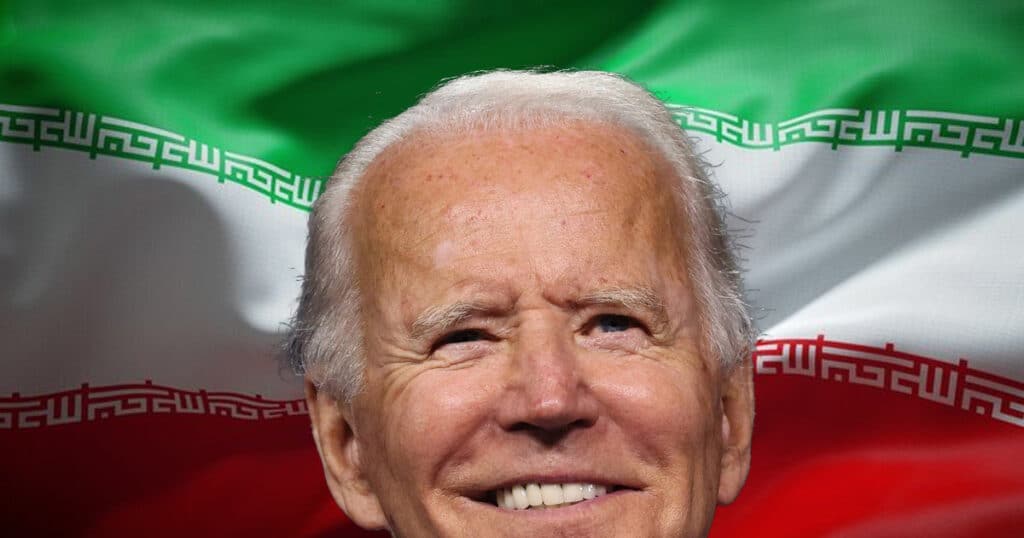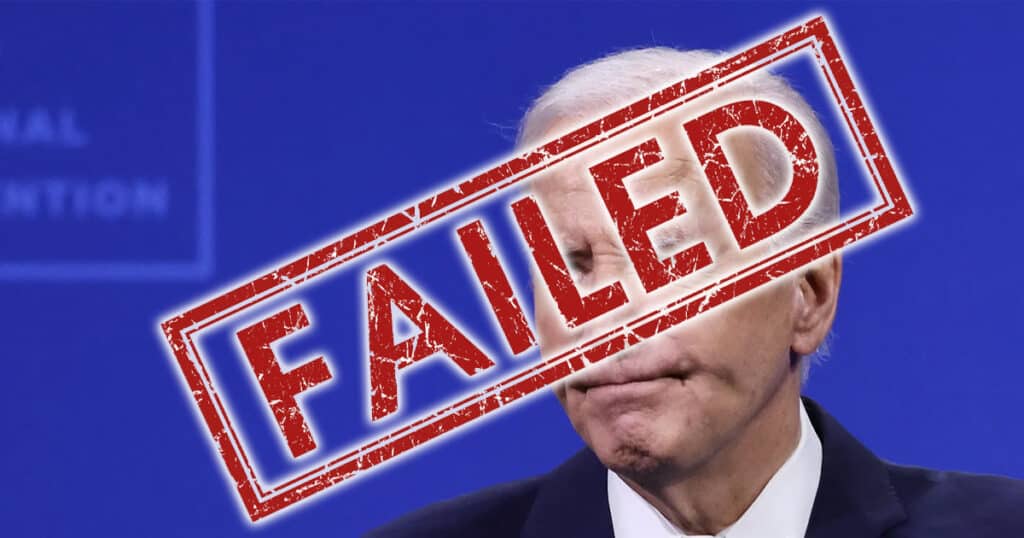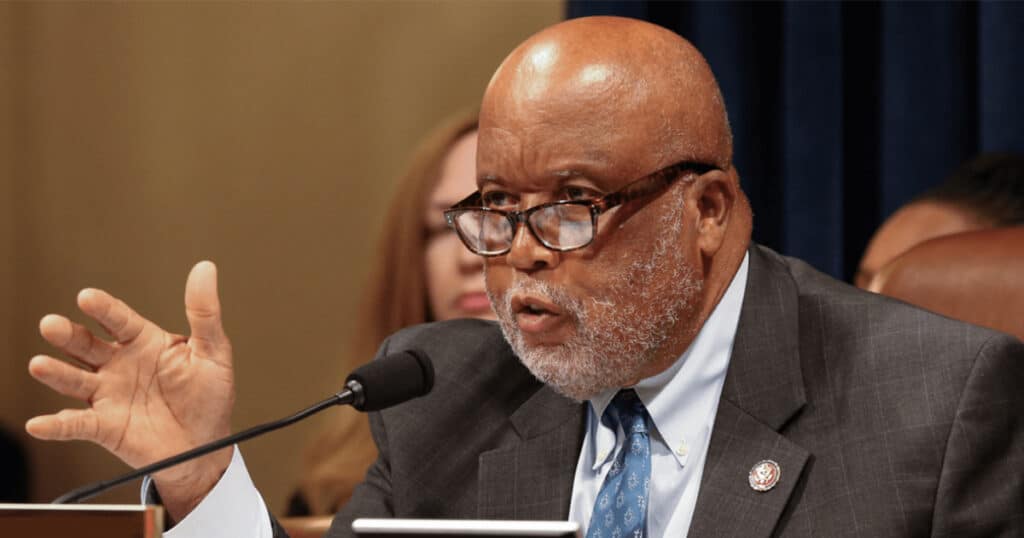
Biden Empowered Iran Proxies Attacking US Forces and Threatening Wider War Against Israel
The budding regional war in the Middle East is a crisis of President Joe Biden’s own making.
Not only has the president empowered Iran by relaxing former President Donald Trump’s sanctions on the world’s top state sponsor of terrorism, but he has also empowered Iran’s proxies through various geopolitical moves that make war more likely. Biden is not alone; previous administrations have directed funds to ostensible U.S. allies in the region, funds that likely contribute to the proxies’ forces.
Biden’s relaxation of Trump-era sanctions netted Tehran at least $77 billion, some of which Iran directs to proxies across the region. Yet the president’s other policies also emboldened Iran’s proxies, who have attacked Israel, U.S. forces, and global shipping since the Oct. 7 Hamas terrorist attacks in southern Israel.
“We have enabled and fed our enemies and constricted our friends,” Rob Greenway, director of The Heritage Foundation’s Center for National Defense, told The Daily Signal. (The Daily Signal is Heritage’s news outlet.)
Greenway, who orchestrated Trump’s sanctions against Tehran, warned that Biden’s policies have “strategically appeased Iran.”
Benham Ben Taleblu, a senior fellow focused on Iran at the Foundation for the Defense of Democracies, told The Daily Signal that Iran has propped up proxies that represent “a state within a state,” exploiting instability in Iraq, Lebanon, and Yemen to “benefit from the largesse of U.S. policy.”
Taleblu notes that this poses a “philosophical problem” for America, which funds Iraq and Lebanon, even though it cannot prevent those governments from funneling that money to Iran’s proxies in their countries. Iran excels at “indigenizing the capabilities” of its allies by partnering with groups that have already arisen in another country.
Neither the White House nor the State Department provided comments for this article.
1. The Houthis
The Iran-backed Houthi movement, a Shiite militant group in Yemen, adopted the slogan “God is the greatest, death to America, death to Israel, a curse upon the Jews, victory to Islam.” The Houthis took control of Sanaa, Yemen’s capital city, in 2014, pushing the country’s then-president, Abdrabbuh Mansur Hadi, to the east. Hadi and his successor, Rashad Muhammad al-Alimi, enjoy support from the U.S. and Saudi Arabia.
During the Trump administration, the U.S. provided billions of dollars worth of arms to the Saudi-led coalition against the Houthis in Yemen. Trump vetoed a bill to block this funding in 2019. Trump’s secretary of state, Mike Pompeo, designated the Houthis a terrorist group in 2021.
Under Biden, however, Secretary of State Antony Blinken reversed the terrorist designation in a move the administration framed as intended to “alleviate or at least not worsen the suffering of the Yemeni civilians who live under Houthi control.”
In February 2021, Biden announced: “We are ending all American support for offensive operations in the war in Yemen, including relevant arms sales.”
The United Nations brokered a two-month truce on April 2, 2022, but the Houthis refused to extend that truce after it lapsed in October 2022.
The Houthis have repeatedly fired on international commercial shipping since mid-November, mostly targeting vessels with commercial ties to the U.S., Britain, or Israel. These attacks have prompted many companies to reroute ships to avoid the Red Sea, which offers a quicker, more direct route for global trade; the companies take the longer, more expensive route around Africa.
Since Jan. 11, U.S. and British planes have carried out retaliatory strikes across Yemen to respond to the Houthi attacks.
Greenway, the Heritage expert, warned that “Yemen aid is also invariably being diverted to the Houthis.”
He said the terrorists “create the humanitarian crisis, demand aid, and divert aid,” in a vicious spiral.
Last month, the Biden administration moved to redesignate the Houthis as a terrorist group, though it stopped short of the harsher designation Pompeo had used. Trump’s secretary of state had put the Houthis on the Foreign Terrorist Organization list, which bars members’ entry into the U.S. and enables the freezing of any Houthi assets in the U.S., among other things.
Blinken, by contrast, announced on Jan. 17 that the State Department would consider the Houthis a “specially designated global terrorist group” after a 30-day delay in which the U.S. would try to facilitate “humanitarian assistance” to Yemenis.
Edem Wosornu, the United Nations’ aid operations director, warned Wednesday against designating the Houthis as a terrorist group, saying the move may harm “Yemen’s already fragile economy.”
Rich Goldberg, a senior adviser at the Foundation for the Defense of Democracies who previously directed a Trump White House program to counter Iran’s development of nuclear weapons, called Blinken’s forthcoming sanctions on the Houthis “toothless,” noting that they include “five broad general exemptions.”
Goldberg mentioned Saudi Arabia’s truce with Iran last year, which he said involved the Saudis “basically buying off the Houthis and the Iranians in exchange for the Houthis stopping drone strikes.”
Goldberg told The Daily Signal that the Biden administration sent Saudi Arabia many signals that it wouldn’t back Riyadh when facing Iran’s provocations.
Saudi Crown Prince Mohammed Bin Salman “decided there is no U.S. support, the U.S. is pumping money into threats attacking Saudi Arabia, so they need to cut their own deal with the Iranians to protect themselves,” Goldberg said.
The Saudis are pouring an “unknown amount” of money into Yemen, he said.
Ben Taleblu, the other senior fellow at the Foundation for the Defense of Democracies, warned that the Houthis have “some of the most damning” missile capabilities of any Iran proxies. He noted that the Houthis launched the medium-range Burkan-3 ballistic missile for the first time in 2019.
2. UNRWA and Hamas
Biden restored funding that may have directly contributed to the Oct. 7 terrorist attacks, when Hamas terrorists brutally massacred at least 1,200 Israelis, including raping women and murdering babies, and taking hundreds hostage.
The United Nations Relief and Works Agency for Palestine Refugees in the Near East portrays itself as an aid organization, but the Israel Defense Forces provided evidence that 12 UNRWA employees took part in the Oct. 7 massacre. The U.S., Germany, Britain, and seven other countries cut off UNRWA aid after the revelations surfaced late last month.
Israel revealed Sunday that Hamas operated a tunnel right underneath UNRWA’s headquarters in Gaza City. UNRWA chief Philippe Lazzarini insisted that the U.N. agency “did not know what is under its headquarters.” He said the agency left its headquarters Oct. 12, five days after Hamas’ terrorist attacks in Israel.
In 2014, however, part of the parking lot at the UNRWA headquarters began to sink, likely because of a Hamas tunnel underneath, The Wall Street Journal reported.
“No one talked about what was causing the collapse,” a former UNRWA official said, according to the Journal. “But everyone knew.”
U.N. Watch’s Hillel Neuer revealed what he claimed to be a chat group with 3,000 UNRWA teachers celebrating the Oct. 7 attacks in Israel. Neuer testified that U.N. leaders “could not possibly have been shocked that UNRWA employees are implicated in terrorism,” because his organization sent them reports in 2015, 2017, 2019, and 2021.
In 2018, the State Department under Trump announced that the U.S. would stop contributing to UNRWA, noting that the U.S. had shouldered a “very disproportionate share” of the burden and criticizing the U.N. relief agency’s “business model and fiscal practices” as “simply unsustainable.”
In 2021, the Biden administration announced plans to provide $235 million to UNRWA, restoring part of the approximately $360 million that the U.N. agency would have expected if the U.S. had not cut off funding in 2018.
It remains unclear how much of this money went to Hamas or to UNRWA employees who may have helped Hamas on Oct. 7.
3. Hezbollah
Hezbollah, Iran’s Shiite militia in Lebanon, arguably poses a greater threat to Israel than Hamas.
“Hezbollah is a threat 10 times larger than Hamas, with long-range capabilities, precision-guided munitions, [unmanned aerial vehicles], and the ability to inflict far more damage on Israel than we’ve seen Hamas do even on Oct. 7,” Goldberg, the senior adviser at the Foundation for the Defense of Democracies, told The Daily Signal.
Hezbollah started a war on July 12, 2006, when militants captured two members of an Israel Defense Forces patrol inside Israel and killed the other three. Hezbollah launched rockets into Israel as a diversion. After Israel responded with rockets, a ground invasion, and a blockade, the United Nations negotiated a cease-fire.
The United Nations approved, and both Israel and Lebanon agreed to, U.N. Security Council Resolution 1701, which, among other things, requires Hezbollah to disarm and withdraw its forces north of the Litani River. That river is about 19 miles north of Israel’s border with Lebanon.
The U.S. has spent billions of dollars over decades funding both the Lebanese Armed Forces and the U.N. Interim Force in Lebanon, a “temporary” U.N. peacekeeping body established in 1978. Resolution 1701 states that the U.N.’s Lebanon force must disarm Hezbollah south of the Litani River, yet to this day, Hezbollah has armed forces south of that river.
“The return on investment is quite negative for the U.S. taxpayer in Lebanon these last two decades,” Goldberg said. “The threat has metastasized to such a degree that Israel is almost deterred from action in a full-scale attack on Hezbollah, and potentially deterred from action against Iran and its nuclear program.”
According to leaks following Hamas’ Oct. 7 attacks, Biden warned Israel against launching a preemptive strike against Hezbollah. “Now we see Hezbollah’s ramped up,” Goldberg noted.
Since Oct. 7, Hezbollah has attacked Israeli outposts along the Lebanese border and launched rockets into Israel. The Jewish state has evacuated tens of thousands of civilians from Israeli villages and towns near the border with Lebanon, fearing an Oct. 7-style attack from the north. Israel has demanded that Hezbollah abide by the terms of Resolution 1701.
A Biden envoy, Amos Hochstein, has been negotiating in the region. According to Axios’ Barak Ravid, earlier this month Hochstein presented a peace proposal to Israeli Prime Minister Benjamin Netanyahu. The proposal wouldn’t require Hezbollah to move its forces north of the Litani River but only 5 to 6 miles from the Israeli border, with the Lebanese Armed Forces filling in.
Hezbollah has already moved most of its elite Radwan force north of this line. Israel would have to pull forces away from the border and move its jets out of Lebanese airspace. Western powers also would send money to Lebanon to sweeten the deal for Hezbollah.
Goldberg denounced the plan as a “bag of magic beans.” He noted that the plan doesn’t explain how fighters who live in southern Lebanese towns would be forced to leave, or how Israel could verify that missiles had been moved from under schools, homes, and hospitals in southern Lebanon.
“Who would ensure Hezbollah can’t come in to attack Israel?” Goldberg asked. “It will be the LAF and UNIFIL. That’s ludicrous after 17 years of teaching us that they will not do anything to stop Hezbollah.”
He was referring to the Lebanese Armed Forces and the U.N. Interim Force in Lebanon.
Hezbollah has “taken effective political control of the country,” so the LAF does not represent any sort of check on Hezbollah, Goldberg said.
“In exchange for giving Israel no sense of security, there reportedly will also be a massive bailout of the Lebanese economy, and an Israeli commitment to negotiate giving up territory on the Lebanese border,” he said. “It’s completely insane.”
Israel needs the ability “to give residents of evacuated communities enough confidence to return to their homes” and to “prevent an Oct. 7-type invasion,” Goldberg argued, and this proposed deal doesn’t come close to meeting those goals.
The U.S. has generously funded the Lebanese army for years, with a slight, unexplained pause during the Trump administration.
“A lot of the money we give to the government of Lebanon goes to Hezbollah,” warned Greenway, director of Heritage’s Center for National Defense.
Goldberg noted that Congress knew the UNIFIL funding wasn’t deterring Hezbollah and yet continued to approve it, anyway.
“Going back to 2007, every year members of Congress wrote letters about the enforcement of [Resolution] 1701,” Goldberg said, specifying that many lawmakers demanded answers from the administrations of George W. Bush, Barack Obama, Trump, and Biden. “It has been a bipartisan failure for years.”
Goldberg noted that the Trump administration attempted to “start enforcing congressionally mandated Hezbollah sanctions” and that the U.S. Drug Enforcement Agency and the Justice Department reopened investigations into the terrorist group that were closed during the Obama administration.
“You haven’t heard anything on cracking down on Hezbollah since Joe Biden took office,” Goldberg said.
Hezbollah released videos in July 2023 showing how the terrorist group prepared for a multipoint invasion to kill and capture Israelis in Israel, Goldberg noted, adding that these videos “look like Oct. 7, only they’re set in Northern Israel, not on the Gaza border.”
“Hamas executed a plan that Hezbollah created,” he said.
4. Iran-Backed Militias in Iraq
The U.S. launched airstrikes on Feb. 2 targeting al Hashd al Shabi, an Iran-linked militia and part of Iraq’s Popular Mobilization Forces, following a Jan. 28 drone attack on the military base Tower 22 in Jordan that killed three American service members.
Heritage’s Greenway explained that the government of Iraq “owns” the Popular Mobilization Forces, but Iran effectively controls them. The U.S. has supplied $10 billion or more each year to Baghdad on semimonthly cargo flights carrying massive pallets of cash, drawn from Iraqi oil sales proceeds deposited at the Federal Reserve, The Wall Street Journal reported. It remains unclear how much of this money goes to Iran-backed militias.
Greenway warned that the Popular Mobilization Forces—an umbrella organization of about 67 diverse militias—are often “bigger than the army, and most groups are under Iran specifically and are designated terrorist groups.”
He also argued that when the U.S. allows Iraq to send money to Iran in exchange for natural gas, these electricity payments constitute a form of money laundering. (The State Department in November extended a waiver allowing Iran to sell electricity to Iraq and use the money to purchase goods overseas.)
As of 2022, Iraq was the world’s fifth-largest oil producer, producing 4.61 million barrels per day, according to the U.S. Energy Information Administration. Yet Iraq imports electricity from its eastern neighbor.
“A major oil producer importing electricity? It’s the stupidest thing in the world,” Greenway previously told The Daily Signal. “Iraq deliberately decides they need electricity and it won’t bring in countries to improve its electric grid.”
The Islamic Resistance in Iraq, an umbrella term for pro-Iran Shiite Islamist insurgents in Iraq, claimed responsibility for the Jan. 28 attack on the military base. The Islamic Resistance in Iraq is an ally of the Popular Mobilization Forces.
Taleblu, the expert at the Foundation for the Defense of Democracies, explained that the Iran-backed militias in Iraq started the Islamic Resistance in Iraq as an “umbrella group designed to further hinder attribution” for attacks.
When Islamic Resistance in Iraq takes responsibility for attacks like the one Jan. 28, it prevents the U.S. and allies from identifying which specific militia carried out the attack, Taleblu said. He described the resistance group as a “proxy for the proxies” of Iran.
For his part, Goldberg noted that the Trump administration attempted to start “squeezing Baghdad to stop financing these militias using U.S. cash.” But its efforts largely failed, he said, due to opposition from within the Defense Department, which sees the militias as allies against the Islamic State terrorist group.
Biden’s Vision for Iran
Why does Biden seem intent on helping Iran? Goldberg attributed the Biden administration’s policy to a balance-of-powers mentality that sees U.S. intervention as the major threat to Middle East peace.
“There is a worldview that in order to create an equilibrium in the Middle East that avoids conflict, you have to empower Iran to be an equal of the Sunnis and Israel,” he said. “Once they have a mutually assured destruction going on, the U.S. can pull out of the Middle East.”
“It’s a completely extremist, nonserious, ideologically fringe worldview, driven by the belief that the Islamic Republic of Iran is not an enemy but an enemy we have created,” Goldberg said.
If Biden wants to avoid a wider war in the Middle East, he needs to take action to deter Iran’s proxies. Unfortunately, the president’s policies seem to have done the opposite so far, perhaps even by design.



